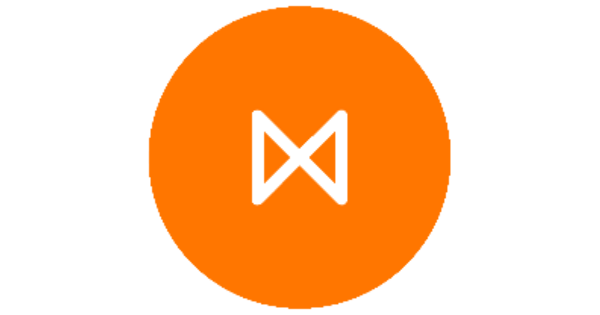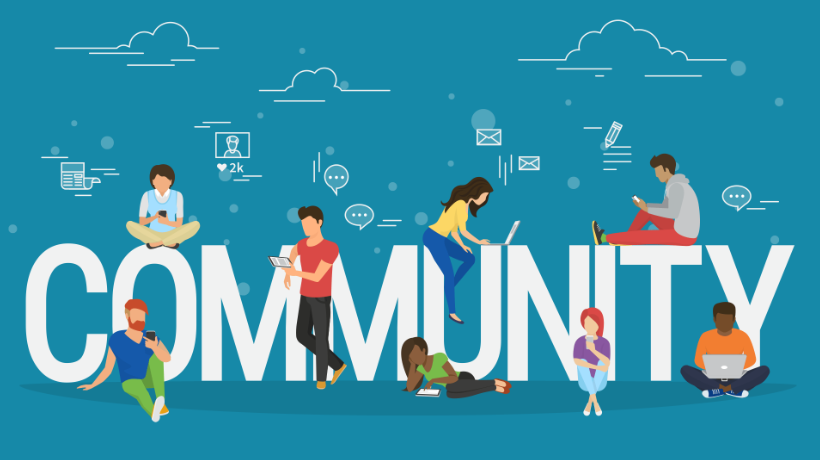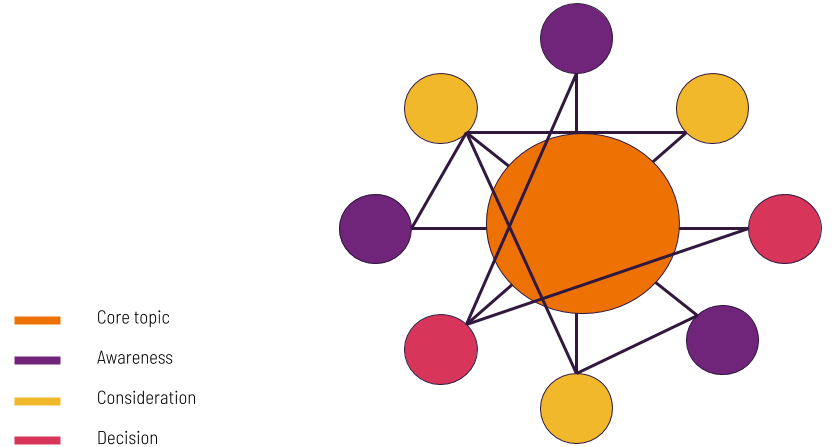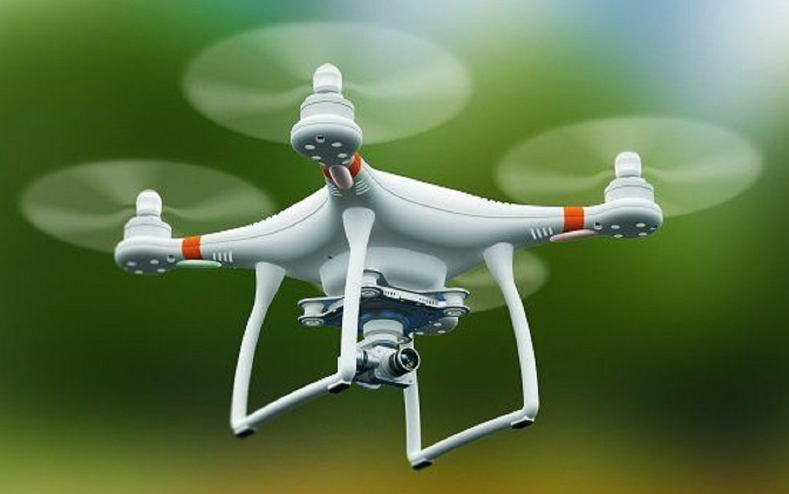How do you grow your business 7% every week?
This week, my very special guests
Lisa and
Louise from
Share with Oscar, discuss the different tactics they are using to grow their business 7% week on week.
Spoiler alert: one of the big drivers is the amazing community they have built.
Share with Oscar is a platform that’s making our cities more liveable through the sharing economy and the first phase of their project is an on-demand parking app. There’s something about these guys, you can’t help but like them. They’re smart, driven to succeed with their business and are always giving back to the community. An example of Share with Oscar giving back is their recent
COVID-19 healthcare worker campaign to share free parking spaces around hospitals and healthcare centres.
In my conversation with Lisa and Louise, we cover a wide range of topics including how to get started when you know nothing about marketing, building a community to drive your marketing and how to scale your business with limited resources.
So please enjoy this special sharing episode with Lisa and Louise from Share with Oscar.
What you will learn in this episode
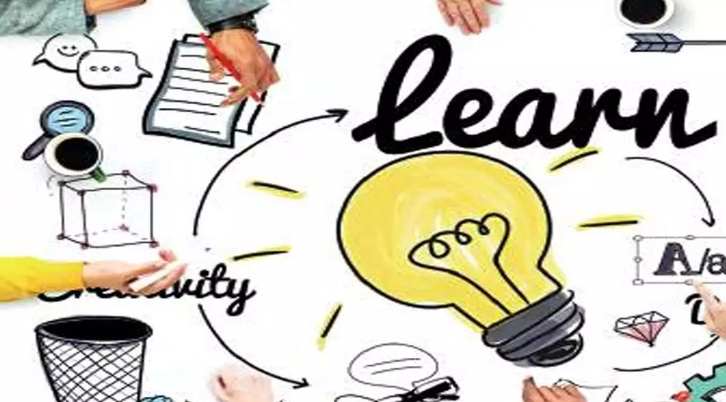
- How to build your product around customers
- Marketing to your customer’s pain points
- Taking on customer feedback and integrating it into future versions of your product
- Word of mouth marketing
- How Oscar got 67 referrals from 1 customer!
- After getting traction in one city, how to expand your marketing activity to the rest of the country
- Using different marketing tactics for a double-sided marketplace business
- How to get started when you know nothing about marketing (spoiler alert: flyers)
- Why offline marketing still works
- How offline marketing can be a good excuse to talk to customers and get valuable feedback
- How to scale your business with limited resources
- How can small businesses utilise the sharing economy
- Why it’s important to have business mentors to take your business to the next level
- Why supervillains are good at loyalty marketing (‘Darth Vader is crushing it’)
- Why learning on the job can be the best way to learn marketing
- Why failure is a good thing (sometimes)
- Don’t build any new features without talking to customers first
Resources mentioned
COVID-19 healthcare worker campaign to share free parking spaces around hospitals for healthcare workers
Share with Oscar
Instabug
StartCon Awards
UNSW 10x Accelerator
Neil Patel Marketing Blog
Intercom
Heap Analytics
UNSW 10x Accelerator
Book Recommendation
Lean In by Sheryl Sandberg
What business would you build on Mars?
This might sound like a bit of a cop-out but it would have to be like a Google Translate for like Martian communication, to communicate between the inhabitants of Mars and us new inhabitants.
Brendan: You guys are very good building apps as well.
Lisa: Yeah, exactly. We’ll build that.
Get in touch with Lisa and Louise
Louise Chen on LinkedIn
Lisa Qi on LinkedIn
Share with Oscar Website
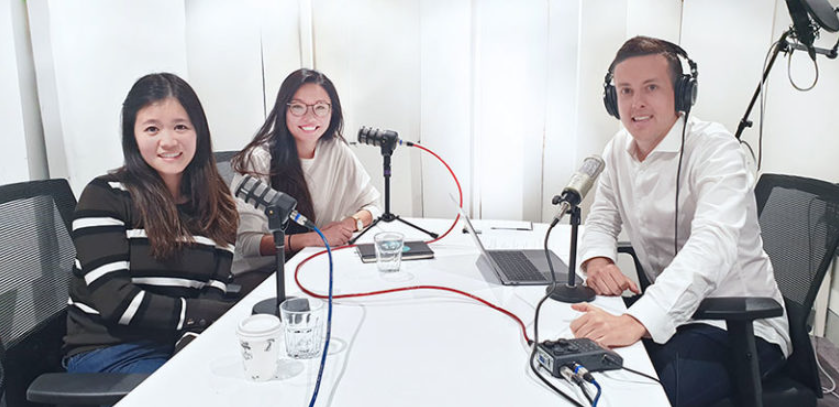
Transcript
Brendan
So, what are you guys sharing, besides lots of value for our listeners, today.
Lisa
So, we are sharing private parking spaces. Share with Oscar is a platform for sharing your driveway or your garage any hour of the day that you’re not using it, and at the same time enables people like you and I, when driving around Sydney, to find more accessible and convenient parking.
Brendan
Awesome. Obviously a massive problem in a big city like Sydney, but one of my big questions is, who is Oscar?
Lisa
Oscar, maybe I’ll share with you the story of how Share With Oscar really came about. So, this would have been several years ago when I couldn’t find parking at Bondi Beach. Like 45 minutes, like an hour, circling round the streets. Driving up to Coogee, down back to Bondi, just trying to find a parking space, and yet you’re passing like thousands of empty driveways and carports, and you’re thinking to yourself, “Why can’t I just park there?” I ended up doing exactly that. So I pulled up to some guy’s house on Warners Avenue, knocked on the door and asked if I could just park in his driveway for a couple of hours in the afternoon, for twenty bucks, and he let me. And his name is Oscar. So, that’s where Share with Oscar was born, and that is who we think represents the persona of sharing private parking spaces.
Brendan
Amazing. So how long have you guys been sharing now?
Lisa
We’ve been in market for over two years. When we first launched, it was over summer in 2017. We launched it at Bondi Beach, so exactly where the problem was inspired by. We were able to get, I think it was like 100 local residents in the area, to just sign up their parking space within a space of about two weeks. That was our pilot in January 2017, and so we’ve been growing all around Sydney, Melbourne and Brisbane in the meantime.
Brendan
Wow, so, I mean, it definitely sounds like a customer-centric approach knocking on people’s doors to get first customer. How have you built the product around the customers?
Louise
So we started out by just really understanding the use cases in terms of how people were using our product, and we discovered that people want to be able to have the option of circling the street to find whether or not there was free parking, and if not, they could just book and park in a spot. So, that’s how we started in Bondi. It’s kind of where the problem was felt in the beginning.
Then we extended our product into areas like the university, we understood that students wanted to be able to find parking close to the uni, but also wanted to try their luck with that street with free parking, so we were able to very quickly roll that out across the universities as well.
Brendan
Awesome. How important has it been for you guys to build that continuous feedback loop with your customers. How much have they had to say in the development of the product?
Louise
Massively. So, when we first launched, we made sure that our product had a lot of tools in place so that we could get customer feedback quickly, so we used tools like Instabug, so when you shook the app you were able to report a bug. We had a customer service line open so you could call us, and also provide feedback. We’re very responsive to emails, et cetera, so all of that was really important was… and that was because we wanted to be able to get that feedback quickly so that we could adapt the product quickly as well.
Brendan
Awesome. In the early days, it’s hard to start a business and get traction. Can you tell me some stories of some of the ways that some of your best users promoted you and got other users on board?
Louise
Word of mouth is really important for our business. We are lucky enough to have awesome users who promote us and tell their friends about us. So one specific user, he actually has a parking space near the university. His nephew goes to the university so his nephew uses his space two days a week, but for the rest of the week it’s pretty much free, and so what he does is he shares his space on Share With Oscar and he’s able to earn a bit of an income on the side for that.
Louise
So, what he’s also done is he’s actually gone above and beyond and written letters to council, to the government on our behalf, saying that they should look at Share With Oscar as a solution.
Lisa
And even had hand-written notes to neighbors. Like urging them to also share their parking space, just because that whole area right now is being torn-up due to the light rail, and so he understands that for university students, hospital staff, everyone in that area, if we kind of embrace the community to share their space, then it could be like a win-win for everyone in that area.
Lisa
We also had this one lady who I think the number is 67 but she referred through the app 67 friends and family to claim just a dollar of credit, because that’s all we were giving out at that time.
Louise
So, the way that the app works is cool in the sense that you can share your parking space and earn credits, and you can refer friends and earn Oscar credits, and then you can use those to actually book parking, so some of our users have gotten to the stage where they have referred so many friends that they’re not having to pay for parking, which is really cool.
Brendan
Amazing. Two-sided referral.
Excellent. We’ve talked about starting a business, how you’ve started. How do you go to that next level? So you’ve got a good level of users now, you’ve got good level of word-of-mouth, lots of referrals. What is the next stage of your journey?
Louise
We’re at a stage where we are seeing that organic growth and organic traction for our business. We are predominantly Sydney based at the moment, we’ve got good footprint across areas in Sydney, but for us the next stage is to expand nationally, so that includes the likes of Melbourne, Brisbane. We’re already seeing spaces pop up organically there, we know there’s a huge demand for more parking spaces.
Brendan
Internally, how do you manage those resources, because you’re a small team at the moment, you have big aspirations. How do you get these parking spots in Melbourne? I imagine there’s a manual element involved as well? How are you guys planning to tackle the big national expansion?
Lisa
There’s probably several different channels in our marketing mix in terms of how we launch into a new market, so given where a market place, obviously, we’ve got supply which is all the parking spaces, and then we’ve got demand which is anyone kind of driving or looking for parking, so there’s kind of different marketing tactics that we’ll use on each side of the market.
Lisa
So, with the likes of say, supply, where it’s individuals with garages, a lot of it has traditionally been offline. That’s kind of how we started when we launched in Bondi, we definitely weren’t experts in marketing at all. The only thing I really knew was like flyers, and like TV ads and billboards, and so it was really, or guerrilla marketing, so we would say to offline kind of we handed out flyers, we went to markets and handed out flyers.
Lisa
I have photos of myself wearing like these stupid billboards walking along the beach. It was very guerrilla and offline for the first couple of months, and then so I think what we’ve really learnt over the last two years has been a lot more digital marketing techniques. That is what will hopefully enable us to scale and launch into different cities, so Facebook ads, SEO, SEM, they’ve been the channels that we’ve really been experimenting with over the last probably 12 months.
Louise
I will say though, even though it sounds super manual, the offline method such as wearing a sign was a great excuse for us to talk to customers, and people would come up to us and ask us, “What is Oscar?” So, because our product is location specific, it was actually a really good way for us to get started in the market as well.
Brendan
It’s super impressive how much customer feedback you guys have got. Almost inadvertently as well, I mean, knocking on people’s doors, the guerrilla advertising, and it definitely shows in your app which I am a proud user of, and it’s also impressive because you guys won App Of The Year. Do any of you guys have technical expertise? Talk us through how you built that up, because obviously it’s a big challenge for small and medium businesses to build an app for their business. How did you go about it?
Louise
I did have a bit of a product background. We literally started with a very minimum viable version of the product, and that’s the one that we took to Bondi to test, and it was a very scrappy version of an app. From that, and having all the … I guess systems and tools in place to actually collect customer feedback live in a small environment, we were then able to adapt and change in. So we learned that initially what we took to market in the beginning wasn’t quite right, and so we were able to change it along the way. I think we’re at a stage now where we’re able to provide a pretty good experience for both the spot owner and the driver, but again, we’re still getting so much customer feedback, so users are involved and so there’s still a long way to go.
Lisa
And I have probably much less of a technical background than Louise, and so when we did build the app, Louise came out from really kind of user-centric you know design perspective, and we had to bring on a developer to actually build it and code it because we had no idea. But Louise, I’m going to emphasize that Louise has really helped us upscale to self in the coding side of things. I think it’s a different language, so, I focus more on the sales and marketing side.
Brendan
Definitely an amazing achievement, though, to win App Of The Year at the StartCon Australasian Awards, you built the app from the ground up with the user feedback, it’s, really amazing.
Lisa
Thank you.
Brendan
So what are some other thing in your business black box at the moment? I mean, what are you currently trying to solve, besides the national expansion?
Lisa
I think, and I think we might have touched on it earlier, so we’re a very small team right now, so it’s just basically Louise and I kind of doing every little thing with the business from the customer service side of things to marketing sales business development capital raising in the future. I think one of our biggest challenges is really trying to scale with such limited resources and time, because it’s just us two.
Lisa
How can we really scale the Share with Oscar model, launch it in a lot more markets, in different cities, being so constrained, and so we have … It’s taken us maybe like two years to really figure out the marketing mix and how to acquire customers, and we’re still just very cautious, I guess, with every dollar that we spend.
Lisa
And so we … it is about you know, really trying to use every single dollar smartly, and lower that cost of acquisition.
Louise
And right now it’s also about how do we use our time smartly? So we’re at the stage where we’re feeling a bit of a growth pain, so we are automating as much as we can, in a smart way as well because sometimes automation can be expensive, to try and also save time, so that we can spend it on other areas.
Brendan
What are your big visions after you’ve conquered the livability issues and the sharing? What else can you see in the pipeline for Share With Oscar? What other areas do you want to tackle?
Lisa
So I guess the way that we see it, I think we’re at a very interesting intersection of two really big themes that are quite hot right now, which is property tech, as well as shared mobility. I’ll touch on the shared mobility first.
So, the way that we see it right now is we are really tapping into underutilized infrastructure so that our cities … We don’t have to build more hideous parking lots, but whilst enabling you and I, everyone to travel from A to B in a much smoother and easier way. Go where that future of that shared mobility might really move into is what everyone’s talking about right now, which is the future of autonomous vehicles. I think we played a very interesting space right now, for … to enable this feature of autonomous vehicles where we would be the network of all parking infrastructure in the future where all these vehicles can just stop, drop off, pick up, all plugged in just through an API.
Lisa
And then the other side, I guess, that other fork, whilst we await this 10, 20 year autonomous future, is in sharing all types of assets. So, what Louise and I are really passionate about is like sustainable solutions to our growing urban cities, without having to just, you know, build more, buy more, manufacture more things. There’s actually ample assets that we all have right now that could be better shared. So, if today we are sharing parking spaces, which is just such a simple asset that so many of us have, and which, you know, when shared, can actually solve a problem that so many of us encounter. We think there are assets or other asset classes that really fulfil this mission as well.
Lisa
So if that, I don’t know, sharing your car, which we know people are already doing, if that’s sharing the space that you have at home. If that’s sharing, I don’t know, the lawnmower that you have that you use once a month, probably. That yet, making better use of all the assets, resources that we currently have.
Brendan
Awesome. And how can small businesses, how can they utilize the shared economy?
Louise
So, at the moment, we already have small businesses on our platform who are renting out their parking spaces during the day when they’re not using it, or during the evenings. So, for example, if you were a café you might not be needing it on the evenings when you’re closed. You might rent it out and just have extra income coming in. So that’s just one way we’ve got small businesses already engaging with our platform.
Lisa
We actually have one small business who is renting out maybe about 30 to 40 parking spaces, and they are making more income through renting parking than their core business, at this stage.
Brendan
Oh, wow!
Lisa
Which is something completely separate, but, yeah, it’s kind of like a very interesting use case.
Brendan
So, you’re a small team doing big things at the moment. Who have been the most valuable people to help you with your business so far, and what recommendations do you have for other small and medium businesses out there, to get these people to take their business to the next level?
Louise
For us, the University of New South Wales has been extremely helpful in terms of helping us access the right networks, giving us advice at the right point in time. So, Lisa was an alumni of the university so we were able to reach out for help at the other stage of their journey and they’ve supported us throughout the whole process as well.
Lisa
Yeah. I think we’ve been really lucky with the support and the guidance that we’ve had, so Louise and I were both ex-corporate so we really did not know much about the whole start-up world or the ecosystem when we quit our corporate jobs. When we first, I guess, left our corporate jobs and really stepped into this space, we really didn’t know where to go for that support.
Brendan
I know you have a lot of loyal followers and a lot of brand champions, so my question is, who is the one super-villain that you connect with the most? Because if you think about, super villain’s followers are very loyal and engaged, just like yours.
Brendan
Think about it, how many times are their plans foiled but their minions, their henchmen, they keep coming back.
Lisa
I thought super villains are solo. What… who are these super villains with followers?
Louise
I don’t know about connect with, but… a super villain that comes to mind that’s got the most loyal following that just go ahead and do their bidding, is, for me, Darth Vader, with all the stormtroopers. Yeah, he’s just conquering, hey?
Louise
He’s got the force.
Brendan
He’s definitely got good staff retention, as well. Willing to die for their startup.
So, in terms of education and learning new things, you’ve had to learn a lot of things yourself with the mobile app development and then get outside help. Are you guys big readers, is that a way that you gain knowledge, as well?
Lisa
Yes. Readers and podcast listeners as well.
Brendan
Oh, nice. Any books that you can recommend to the audience that have helped you with Share With Oscar?
Louise
So, in terms of learning new hard skills, like coding or marketing, I haven’t actually learned that through reading books in particular. I’ve learned those through reading just articles. Neil Patel is one that I read regularly in terms of how to better reach the customer via SEO, SEM et cetera. In terms of actual books broadly, I’d recommend for female entrepreneurs, to read Sheryl Sandberg’s Lean In, just because I feel like she’s done a really good job of bringing a lot of humility into her journey and actually articulating a lot of the problems that female entrepreneurs have in a really human way.
Louise
I feel like, after reading that, even though, a lot of it was quite vulnerable, I felt quite empowered after reading that, so I definitely recommend people read that.
Brendan
And Lisa, any book recommendations?
Lisa
To be really honest, I don’t remember the last time I read a book. It would probably be … probably high school reading. That’s why I stopped when you said that question.
Louise
She hasn’t read Harry Potter!
Louise
Lord Voldemort would be another villain.
Lisa
Again, no idea what you guys what you nerds are referring to…
Louise
But I would have liked to have answered that previous question with the villain that didn’t get defeated, because I feel like, is there one?
Brendan
Well, in some ways, Darth Vader didn’t get defeated because he helps Luke defeat the Emperor.
Louise
Okay. All right. So, let’s stick with that.
Brendan
So Lisa, I know you aren’t a massive book reader so what other ways do you sort of upscale and educate yourself?
Lisa
What a setup. I think it’s actually just doing and learning on the job.
So, you’re right I don’t read much, but everything that I do, I google, and read up on it extremely quickly. I’m all about efficiency, so give it a go, if it doesn’t work google it, give it a go, if it doesn’t work ask someone who knows.
Brendan
Learn by doing?
Lisa
Learn by doing.
Lisa
YouTube videos, but only if they are under three minutes. No 20 minute tutorials. Mind you, when we first built our website for Share With Oscar I built that on WordPress following a two hour YouTube tutorial. It took me like three weeks, watching a two … Following step by step that YouTube instructional video on what to do, how to add a button.
Everything. I much … I prefer short form learning.
Brendan: So how do you educate your customers in a short form way?
Lisa: We have a lot of video content below three minutes.
Louise: Below thirty seconds.
Lisa: Below thirty seconds. Hopefully the product is built in a way actually-
Louise: Self explanatory …
Lisa: Where they can kind of pick it up themselves, we don’t have to educate them too much.
Brendan: Right.
Lisa: But we do have on our website we built an integrated intercom to kind of prompt and answer any questions that people might have along the way.
Brendan: Awesome. I know you’ve had an exciting journey building Share With Oscar. You’ve had a story corporate career as well. So, if you could go back and give your 20 year old self one piece of advice what would that be?
Lisa: What was I doing when I was 20? I studied at uni for much longer than I should have. I spent seven years straight at university. Not because I failed subjects, but because I didn’t know what I wanted to do.
Brendan: Right.
Lisa: So I just kept studying so I was probably still studying at 20. I would probably tell myself that it’s all going to be okay, you don’t need to be good at uni, and that everything will fall into place, just go for it.
Brendan: That’s interesting as well. Would you recommend that people that don’t know what they want to do, to potentially jump into the small business world to give a couple of areas a try?
Lisa: I think so. I think back then during uni the reason I stayed for so long was because I didn’t know what I wanted to do. There wasn’t … The degree that I studied wasn’t the field that I wanted to enter into. Back then there wasn’t a course about entrepreneurship or starting your own business or anything like that. I did a finance degree, I did accounting, I did psychology, but they weren’t the fields that I naturally fit into. I ended up going into … I guess business consulting and strategy consulting. That’s where I picked up a lot of the skills which has set down the foundations for building Share With Oscar, and I just kept going.
Louise: For me it would just be say yes to opportunities you’re presented with, and be braver and bolder earlier , because essentially you are almost put into a safe environment where it’s okay to fail and if you do fail it’s not necessarily a bad thing. I think that early on you are taught that failure is a bad thing but actually you could learn a lot from it as well.
Lisa: Absolutely, when you are 20 there isn’t that much to lose. You know … in terms of … I guess the responsibilities that come into your 30s and 40s. I’d say 20s is the time to give everything a crack, to give your first business a crack if it fails, it fails, you learn so much more.
Lisa: The way that I guess … because obviously right now doing Share With Oscar it’s a big risk, you know with lots of businesses I think the statistics for a failed business is just extremely high. So the way we kind of see this is even if it doesn’t work, it’s like equivalent to having invested two years of our lives into studying an MBA. Why study an MBA and commit 50k, 100k, or however much they cost, when you get a much more valuable experiences out of starting a business.
Brendan: I think that’s amazing advice. Your 20 years old selves are going to be really crushing life.
Brendan: When you hear the word successful, who comes to mind and why?
Louise: Its no one.
Lisa: It’s not that no one comes to mind, it’s that there are so many then there’s like so many obvious ones, I’m just trying to think who would be a good example.
Louise: The reason I’m hesitating with that, is because I was thinking another piece of advice that I would give my 20 year old, would be don’t take what other people define as success as your own success, because ultimately whatever one ends up working towards for us back then when we were 20, would be to go for that corporate job or … There are certain types of jobs that you would go and get because that would be leading you on the path towards success.
Louise: I think if I had understood that earlier, I might have taken a different path as well. In terms of success I think for me I think Oprah is like my big success because she’s just so generous. She’s just giving away things all of the time, and she’s helping other people and she’s reached a point in her life where she’s giving back and so I think that’s pretty admirable.
Brendan: So you guys have some amazing access to that raw customer feedback that many businesses don’t have access to. What do you do with the customer feedback, and how do you make sure that you’re not building features that people don’t want?
Louise: We use Heap on our links so that allows us to see what features of the current app people are using, how long they are spending on certain components of the app. Then we are able to also track that back to individual users and then dig a little bit deeper to understand how they are using our app.
Louise: We also have a group of super users that we continually refer to and speak to, to get their feedback before we build anything. I think that is the most crucial thing and something that we learned early on was to not build anything and not to spend time and money on building features without having spoken to customers first.
Brendan: Right, and how do you keep these guys engaged, do you give them some kind of incentive for their feedback because I mean, it’s always hard to get feedback from customers.
Louise: Surprisingly, we don’t really need to and they haven’t asked for that. They just see value in our service, and they believe in the mission that we are trying to work towards, which is to reduce congestion on the streets, take cars off of the roads and put them into parking spaces quicker.
Lisa: Especially the early adopters, the ones who have stuck with us for the last kind of two years from when we first launched in Bondi. I think they all feel like they are part of the journey, which is what we want them to feel that they are part of the creation process, because we are designing an app for consumers and then because people love the idea or the concept of it and it’s an app that they use and it’s for them I think they all like to contribute and provide their two cents.
Brendan: What is the moment in business history that you would like to witness in person?
Lisa: A moment in business history, so like … obviously the past.
Lisa: No, it could be something in the future like what would be in the history books-
Brendan: Google translate on Mars.
Lisa: You know what I mean?
Louise: A moment in business history …
Lisa: I don’t know much about history, go on. I don’t read, remember?
Louise: I would like to be in Steve Jobs’ garage when he was first coming up with the first product for Apple, because he is super user focused and he’s got such an eye for design that I think that would be pretty interesting. The other ones that come to mine would be related to huge business failures. I wanted to see how they actually were responding to that, in the moment. I think that’s also interesting.
Lisa: Yeah, and all of the … kind of the controversies and all that.
Louise: Yeah, Enron.
Lisa: That’s what I was thinking, just to be amongst it. See what was actually going on.
Louise: Yeah. How they were fighting the fire.
Brendan: Speaking of business failures, are there any stories that you can share with us of massive learnings that you’ve had from massive failures?
Lisa: I can’t think of any, it’s just been such a smooth ride.
Louise: We’ve done everything perfectly.
Louise: We’ve definitely made a few mistakes along the way that probably cost us a bit of time and money, but I think ultimately without those mistakes we wouldn’t have learned, so I don’t completely regret them, I guess.
Louise: One of them would be launching as an app in the very beginning. When we launched, our product was an app, and what that meant was there was a bit of friction for the customer to actually get our product. So, maybe we didn’t get as many users in the beginning as we could have, and we didn’t quite test that in the beginning.
Louise: The flip side of that is that what we found was, when the problem you’re solving is so big that people are willing to climb mountains to get to the solution, that is also proving that you really are developing a painkiller as opposed to a vitamin. That was also a good learning I guess.
Brendan: Awesome. Lisa, Louise, we really appreciate you coming in and giving all of your valuable life lessons and business lessons to the audience today. Before you go we’d like to ask one creative and abstract question, that we ask every single guest. So, are you guys ready?
Lisa: Mm-hmm (affirmative)
Brendan: Don’t sound too excited.
Louise: That’s an abstract question already.
Lisa: Yeah. I wonder how abstract this could get.
Brendan: So you’re on the first flight to Mars with Elon Musk, and the first settlers aboard the SpaceX star ship rocket, what business do you start when you land on Mars, and how do you promote it to the new Martians?
Lisa: Question. New Martians are the inhabitants of Mars already …
Brendan: It could be.
Louise: Or like … a waves of Martians … Define our customer group.
Lisa: Okay … This might sound like a bit of a cop out but it would have to be like a Google Translate for like Martian communication.
Brendan: We haven’t had that answer before.
Lisa: There you go … So … To obviously communicate between the inhabitants of Mars and us new inhabitants.
Brendan: You guys are very good building apps as well.
Lisa: Yeah, exactly. We’ll build that.
Brendan: Louise?
Louise: I guess one serious answer would be … maybe we could sell oxygen. To the Australi … Not the Australians.
Lisa: The Australians.
Brendan: Australian only oxygen.
Lisa: Humans.
Brendan: I like both of these answers, I think they are both definitely viable, and the way you guys build businesses, getting customer feedback, and continuous iteration I’m sure they’ll both be very successful on Mars.
Lisa: Because of my Google Translator tool.
Brendan: That’s right. So, Lisa, Louise, really appreciate the time you spent with us today and the value that you’ve provided to the audience.


